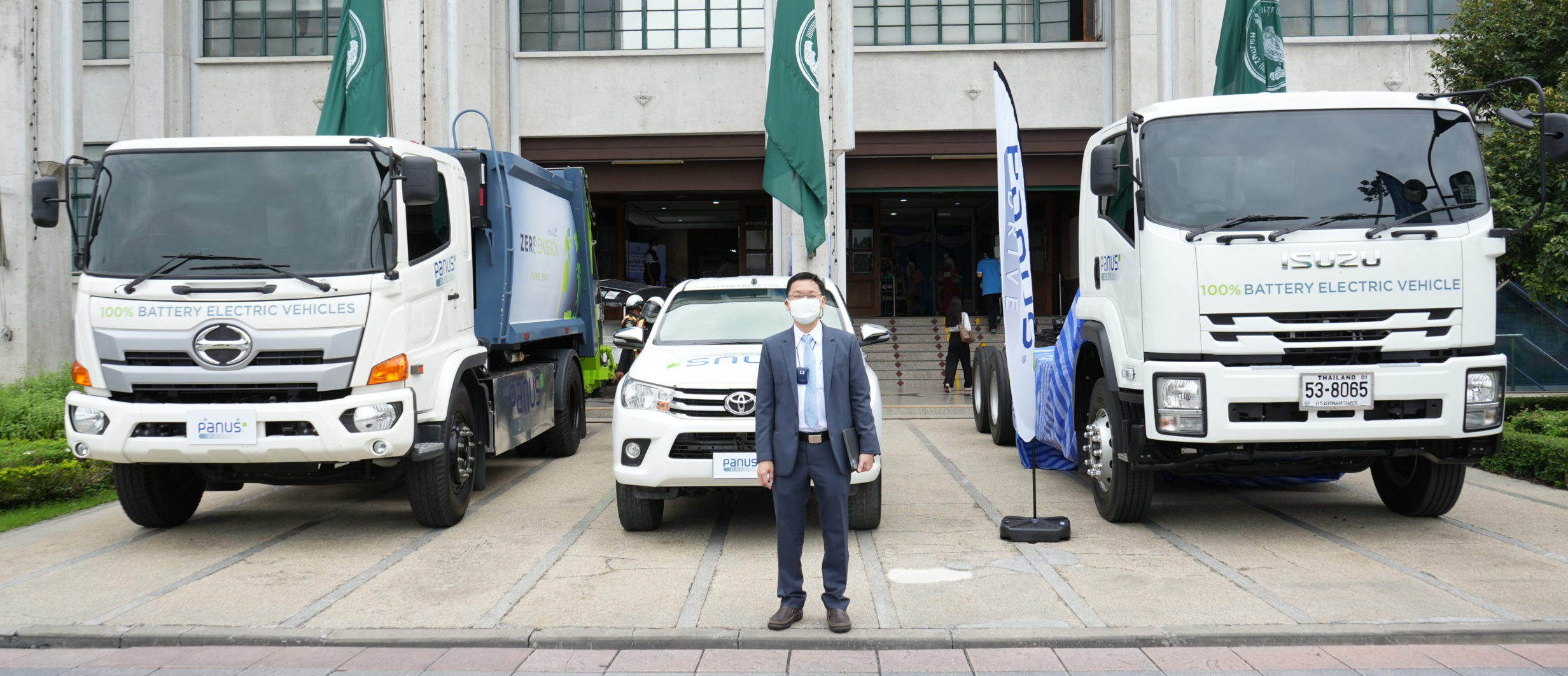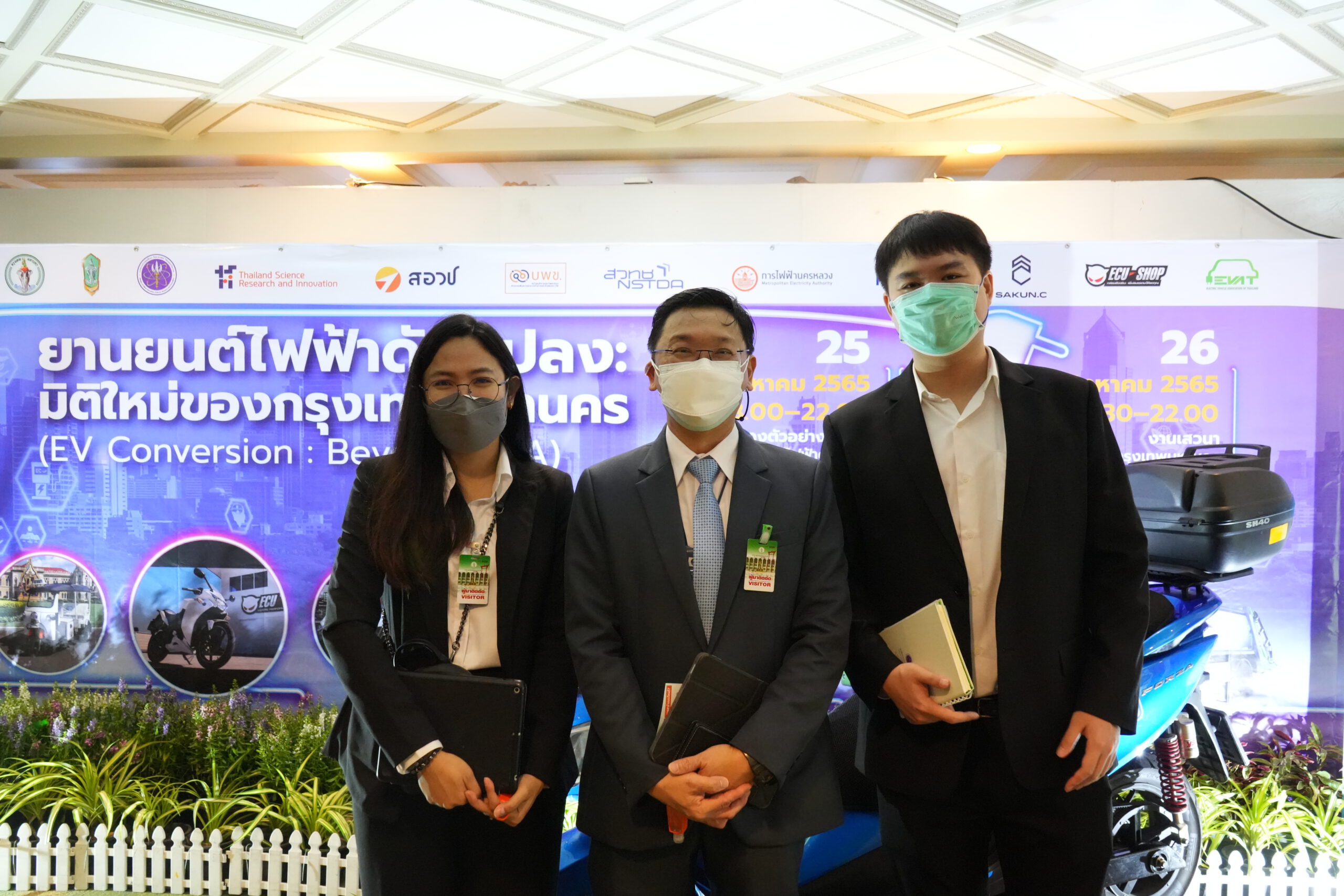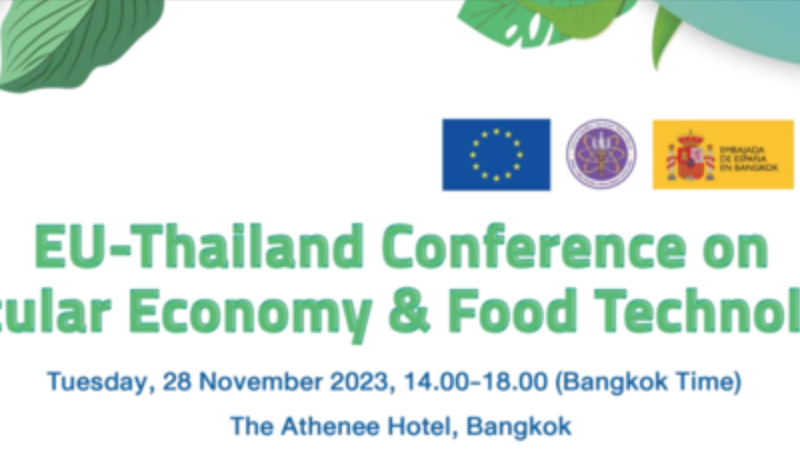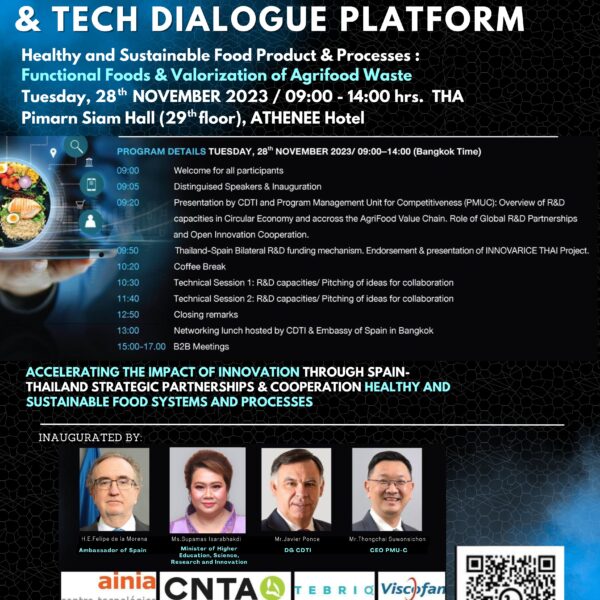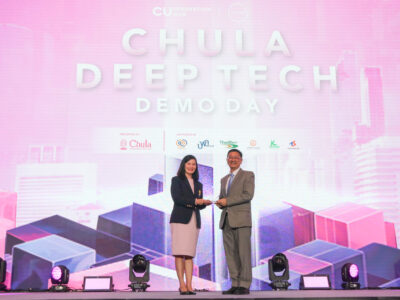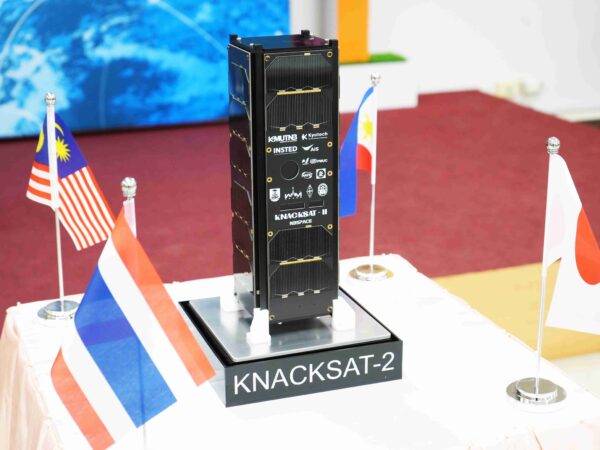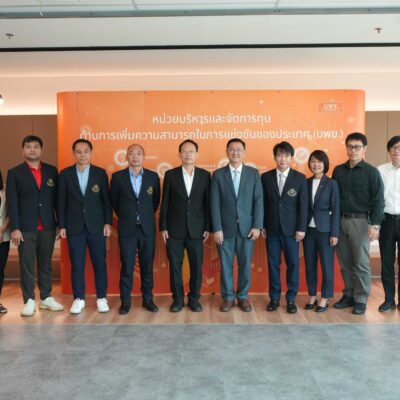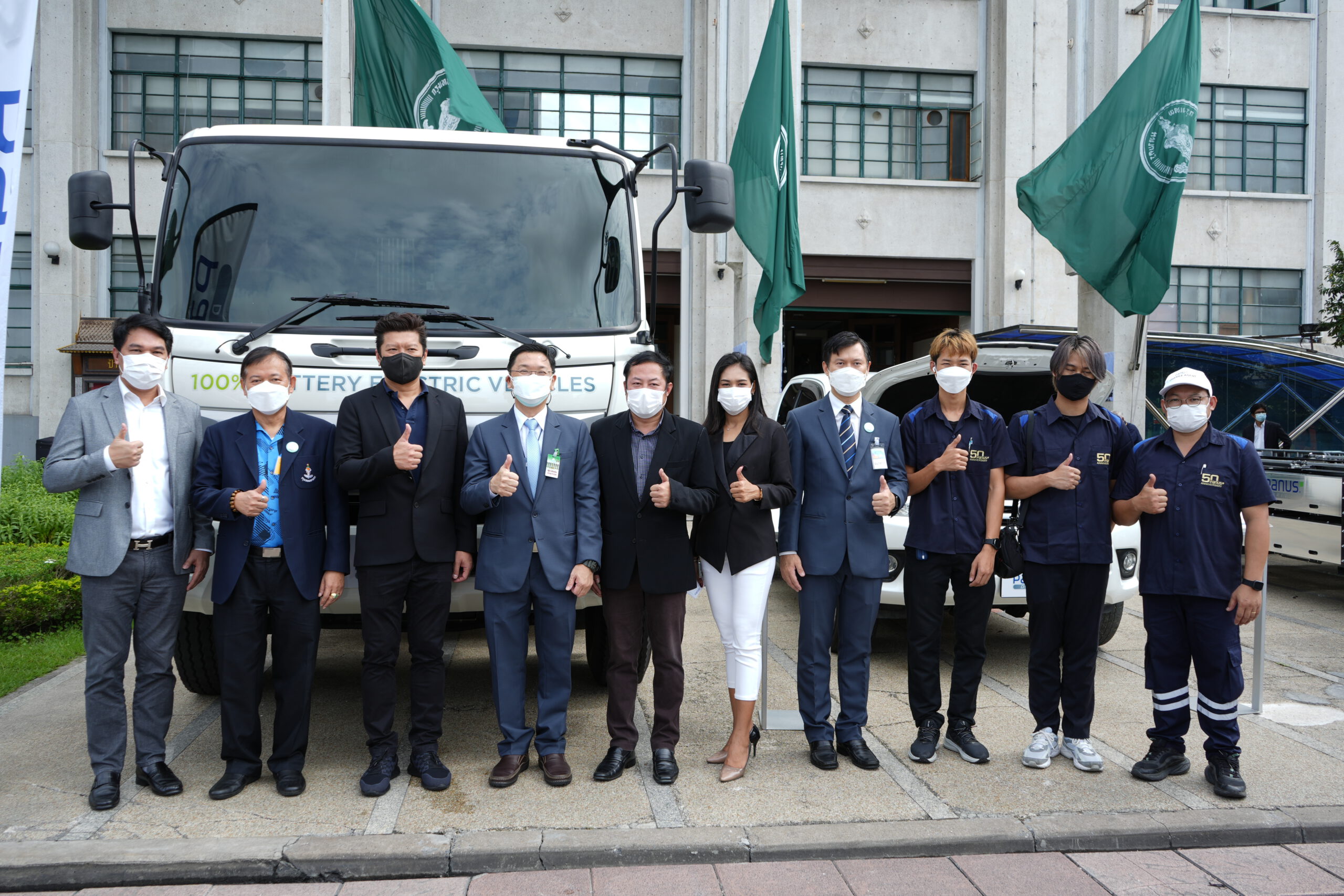
On 26 August 2022, Program Management Unit for Competitiveness (PMUC), Office of the National Higher Education, Science, Research and Innovation Policy Council (NSTDA) participated in the exhibition: “Electric Conversion Vehicles: A New Dimension for Bangkok (EV Conversion: Beyond BMA)” with Assoc. Prof. Thongchai Suwanasichon, Ph.D., deputy director of PMUC, along with representatives from Bangkok municipalities and the task force in charge of driving policy on electric conversion vehicle and energy storage systems, the National Science and Technology Development Agency (NSTDA), Phanat Assembly Co., Ltd., ECU Shop 1 Co., Ltd. and the Metropolitan Electricity Authority attending the event.
The Ministry of Higher Education, Science, Research and Innovation (MHESI) participated at the booth and presented converted electric vehicles, which received funding support for research and development from the Program Management Unit for Competitiveness. In the event, the Office of National Higher Education Science Research and Innovation Policy Council (NXPO) and the National Science and Technology Development Agency (NSTDA), in collaboration with universities and private sectors, showcased the research outputs of converted electric 10-wheel trucks, converted electric 6- wheel trucks, converted electric pickup trucks, converted electric buses and converted electric motorcycles for commercial production, all of which were developed by 100% Thai researchers. During the event, organized on Friday, August 26, 2022 at Rattanakosin Room, Bangkok City Hall (The Giant Swing) presentations of sample converted electric vehicles were on display in the courtyard area. Mr. Khajit Chatchawanich, Bangkok Permanent Secretary, presided over the opening ceremony for the presentation of academic work by the trainees of the 17 th class of the Metropolitan Executive Program. In attendance were senior executives of Bangkok municipality, external agencies, Electric Vehicle Association of Thailand, electric vehicle entrepreneurs and the interested public.



The objective of this study on the topic of “Converted Electric Vehicles: a New Dimension for Bangkok” was to study the concept of converting vehicles used by government agencies, under the Bangkok Metropolitan Administration, to electric vehicles (EV Conversion), and to make policy recommendations to serve as a guideline to drive the development and conversion of Bangkok’s electric vehicles to achieve concrete results. This is in line with the goal of developing Bangkok into a livable city in accordance with the 20-year national development plan for Bangkok, and is consistent with the policy proposed by Mr. Chatchat Sittipunt, Governor of Bangkok (5 goods consisting of 1. Good management 2. Good travel 3. Good environment 4. Good economy and 5. Good health).
Mr. Khajit Chatchawanich, Permanent Secretary for Bangkok Metropolitan Administration, said this activity is in line with the policy of the Governor of Bangkok. The Bangkok Metropolitan Administration has a project to make 10 prototype converted electric cars in the Sathorn district, which can be registered with the Department of Transport. In the future, Bangkok will not have to buy new cars but will bring old cars that are over 7 years old and in good condition to be converted to electric cars. Moreover, in the future, Bangkok Vocational Training School, Social Development Office, will organize a training course on vehicle conversion for the interested public to further be applied in reducing PM2.5 pollution in the Bangkok area, improving the health of the general population and
making Bangkok a more livable city.




At the event, there were academic presentations by Mr. Nichakan Ngamwong, a representative of the 17 th class of the Metropolitan Executive Program, reporting that current consideration to apply converted electric vehicle technology (EV Conversion), which produces zero emissions, will cost less than new electric vehicles, and can be designed to have high efficiency similar to that of new electric vehicles, especially in the commercial electric vehicle segment. Applying the technology in the case of Bangkok is a major challenge in managing pollution and the environment at the origin of the problem, as well as in combating the increase in fuel cost by converting government vehicles to electric platforms. The key concern is in how to manage which groups of cars will be an effective initial pilot and how to raise public awareness at the same time. Study found that Bangkok is highly prepared in terms of policies and cooperation in reducing CO2 and PM2.5 pollution with cooperation from relevant agencies. Bangkok’s automotive fleet has very few varieties and there is a sufficient number of cars to serve as a feasible model city. The initial plan can prioritize vehicles that consume a lot of fuel and run predictable routes and distances to serve as the pilot group. The converted electric vehicles project can be carried out by consulting with government agencies, as well as the educational and private sectors.

As for the academic activities at the event “Converted Electric Vehicles: New Dimension for Bangkok (EV Conversion: Beyond BMA)” on August 26, 2022 at Rattanakosin Room, Bangkok City Hall, there were many interested participants in attendance. There were exchanges of ideas on how to make Bangkok a low-carbon and a more livable city, including the introduction of more electric and converted electric vehicles. In the forum, information and operational plans of relevant sectors were provided as follows:
Mr. Bancha Ngeamngamsri, director of the Mechanical Factory Division, Bangkok, said that to reduce CO2 and PM2.5 pollution stemming from the use of vehicles in Bangkok, four approaches are considered: 1) new purchases, 2) rentals, 3) installation of exhaust filters, which are relatively costly, and 4) converting internal combustion engine vehicles to electric drive systems. It was deemed that this conversion option will allow taking a car that is 7-8 years old which still has a good chassis to be converted to an electric system. This approach is being studied in terms of return on investment, the feasibility of registration for real use, and the creation of an ecosystem in accordance with the policy of the Governor of Bangkok.
Mr. Manoon Sivapiromrat, chairman of the task force to drive the policy of converted electric vehicles and energy storage systems, House of Representatives, said that the working group to drive the converted electric vehicle policy has worked to develop and push for a creation of converted electric vehicle industry for Thailand by focusing on creating entrepreneurs; generating know-how to enable Thai entrepreneurs to become brand owners; supporting the establishment of laboratories for type tests and Individual tests; encouraging private vehicle inspection stations to develop battery testing capabilities; pushing for regulations to allow the registration of converted electric vehicles; and providing various incentives, both financial and non-financial. The task force is willing to help support related issues as well.
Mr. Burin Kerdsap, head of Motor Research Team and power conversion (MAP), NSTDA said that the agency’s important achievement on converted electric vehicles has been developed and tested for actual application, such as modifying buses of the BMTA into electric buses. It is a success that resulted from a collaborative consortium between 3 electric utility authorities, the NSTDA, and 4 private sector operators. Thai business operators possess the capability and ability to create an industry, having a large impact on the society and the environment with EV conversion technology, which can be molded into another Product Champion. Moreover, the NSTDA can serve an important function in providing advice and design services, research and testing of parts, as well as lending
support in development of EV conversion technology for domestic entrepreneurs.
Mr. Panus Wattanachai, Chief Executive Officer of Panus Assembly Co., Ltd., said It is a Thai company that receives research and development funding for electric vehicles and converted electric vehicles from the PMUC. It has developed vehicles that have passed performance tests for commercial use. The vehicle were presented for demonstration and the interested public was allowed to test drive a converted electric pickup truck, a converted electric 6-wheel truck (garbage truck) and a converted electric 10-wheel truck during the event. Additionally the company has designed and developed the EV Conversion Kit and Software to be suitable for usage conditions in Thailand. It is modular so that it is easy to adapt to any brand of vehicles and is ready to be used in training and transfer of knowledge for further development and career creation for SMEs and government agencies, ultimately helping to reduce fuel costs and improve the health of the general public.
Mr. Polpot Wanpinyochep, managing director of ECU Shop 1 Co., Ltd., said that the company has developed various types of controllers build by Thai people. This achievement helps to harness the potential of the equipment and the electric drive system, which can be customized to be more efficient. This opportunity that we have been given is only a short time window, therefore when we invest in technology development, if it is not materialized into actual commercial application within a period of 2 years, it will become obsolete, and will necessitate investment in new research and development all over again. This would be an unfortunate waste of resources and cannot be sustainable long-term. Therefore the intention is for all sectors involved to push for widespread application as quickly as possible in order for this effort in creating a new industry for the Thai people to be successful.
Acting Second Lieutenant Wira Sukphueak, assistant director of Electrical System Research and Innovation Department, the Metropolitan Electricity Authority said that the agency has prepared electricity to support the use of electric vehicles up to 1.7 million vehicles in 2027 and up to 3.7 million vehicles in 2032. After 2037 the agency will support at least 800,000 vehicles per year. on average, so the required amount of electricity will be procured and the Electricity Authority has jointly developed converted electric buses with the NSTDA and the private sector. Moreover there are plans to retrofit vehicles using different types of electric utility, such as cars that provide wiring repair services, pickup trucks, and station cars, etc. The converted electric vehicle technology is considered very important in helping the existing businesses to continue in their operations.
Mr.Thanakan Vongdeethai, Joint Secretary of the Future Mobility Subcommittee, PMUC, the discussion host and representative of the 17 th Metropolitan Executive Program, concluded that converted electric vehicle technology is the hope and opportunity of the Thai industry. In addition to helping to reduce fuel costs and air pollution, as well as reduce public health problems, it can also help to create jobs and careers for the people. It can also help to extend the development towards large-scale production to achieve price competitiveness as well as leading to the creation of new industries. Consequently, relevant agencies need to quickly address problems and push for progress. Many relevant agencies hope that this pilot application of converted electric vehicles in Bangkok will be considered a new dimension that will help to promote progressive changes in the industry.



